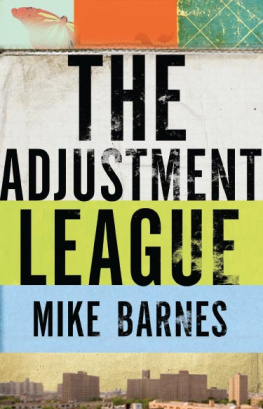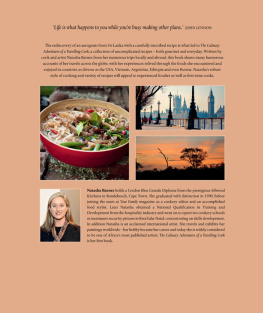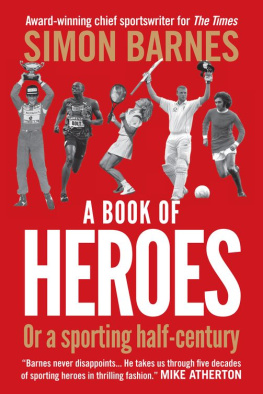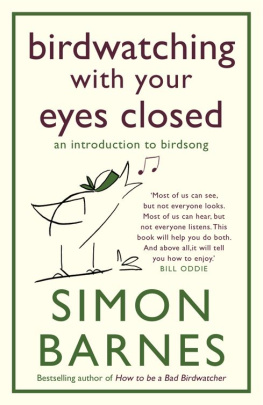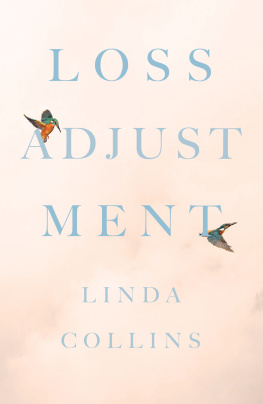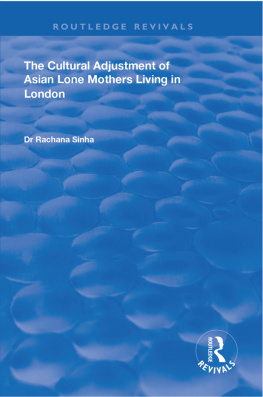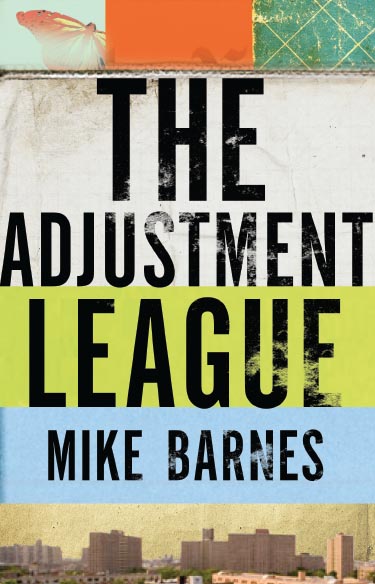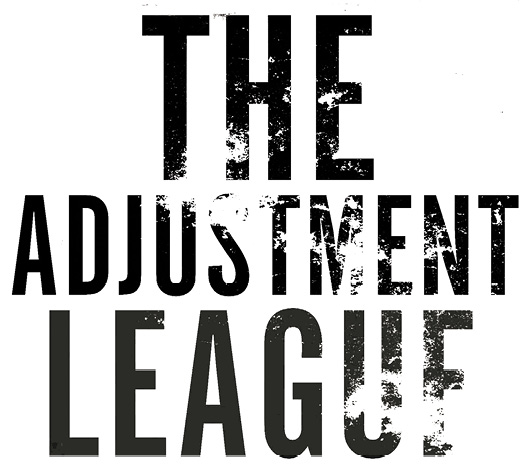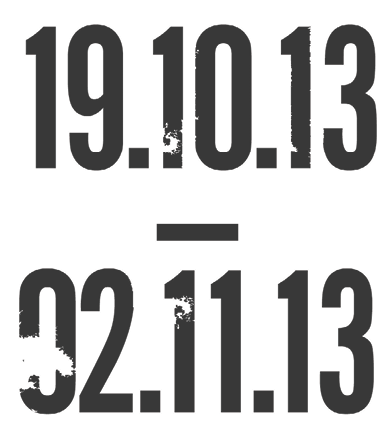THE ADJUSTMENT LEAGUE
File 1: The Boiled Child
BIBLIOASIS
WINDSOR, ONTARIO
Copyright Mike Barnes, 2016
All rights reserved. No part of this publication may be reproduced or transmitted in any form or by any means, electronic or mechanical, including photocopying, recording, or any information storage and retrieval system, without permission in writing from the publisher or a licence from The Canadian Copyright Licensing Agency (Access Copyright). For an Access Copyright licence, visit www.accesscopyright.ca or call toll free to 1-800-893-5777.
FIRST EDITION
Library and Archives Canada Cataloguing in Publication
Barnes, Mike, 1955-, author
The Adjustment League / Mike Barnes.
Issued in print and electronic formats.
ISBN 978-1-77196-082-3 (paperback).--ISBN 978-1-77196-083-0 (ebook)
I. Title.
PS8553.A7633A35 2016 C813.54 C2016-900904-1
C2016-900905-X
Edited by Daniel Wells
Copy-edited by Natalie Hamilton
Typeset by Chris Andrechek
Cover designed by Gordon Robertson



Published with the generous assistance of the Canada Council for the Arts and the Ontario Arts Council. Biblioasis also acknowledges the support of the Government of Canada through the Canada Book Fund and the Government of Ontario through the Ontario Book Publishing Tax Credit.
for Heather
Saturday morning, early. Sweeping up broken glass and litter on the lobby stairs, I catch a peep of white from the mailbox below. Inside, a line in blue ink on a folded sheet of paper. Handwriting I dont recognize, though a wobble in the letters tugs at me. An address up on Highway 7.
Then the three block capitals: TAL. Which I do know.
An hour later, up in Markham, I pull over on the long drive opposite the covered entranceway. Sitting in the Honda, I take it in. The sign flanked by junipers behind a low rock garden: VIVERA: A Helping Community . Below, in smaller letters: With Special Assistance For The Memory Impaired . Words to hang on City Hall.
Two stories in brick and wood, spacious, with long side wings. Fresh white trim around picture windows. Shrubs and flowers rising from raked wood chips beside the walkway. Gourds and ornamental grasses in big ceramic urns leading to the double wooden doors.
Vibe of an old-time farmhouse or plantation manor. Rambling as generations add on wings. The gray McHomes stretching to either side a jarring note. Ditto the four lanes of traffic. But the low-lying woods to the north, aflame now with scarlets and yellows, work perfectly.
Inside, old people. Women, mostly. In armchairs, on couches. Two in wheelchairs helping an Asian girl put creamers in bowls. A woman gripping her walker, another inching hers ahead. A ginger-spice smell thats hard to place. Apple cake? Sunday pot roast? Slow, savoury hours. A gray terrier and a calico cat mooching about.
Judy Wyvern, I tell the young black receptionist. She looks up from her magazine, frowning at what she sees.
Remembering, she gentles her face. Family? The phone rings and she holds up a finger. Behind me, I hear Just a minute, but am halfway across a livingroom-like space towards the door marked Director.
Older than the receptionist, mid-thirties, palely pretty with long black hair. Gray business suit and slacks over a ruffled white blouse. She extends a hand at Judys name. Family?
I give her the slip of paper. Im sorry, she says. Her eyes stray up me without a flicker. Why shes not answering phones. She pulls a file over the form shed been filling in. Come with me.
Peoples assumptions will carry you a long way. If you dont force a scene, their own hunger to find one will take you a few steps further than you were meant to go.
First, see it plain.
The soldier and the bride, bodiless costumes facing each other across the shallow alcove. Sunlight slicing between pulled drapes, pooling on the stained carpet. The soldier hanging on one wall, low, the cuffs of his dress khakis almost touching the floor. Spikes under his shoulders, elbows and wrists make his arms seem to rise in a welcoming embrace. Opposite him, the bride in her white gown, pegged and cinched to a wooden frame. A corner of her veil tacked loosely above one shoulder, as if swept there by an errant breeze. Between them, on walls and tables, pictures of the times they lived through. The War and After.
The bubble woman following us steps cautiously toward the soldier. Stops, turns, approaches the bride. Her hand rising to touch the fabric. Down. Then up again to take a bit of the silk between thumb and forefinger. Rubbing gently as if to test it. She opens and closes her mouth several times. Finds her bubble sound of surprise. Puh.
Does she see that shes headless? I say.
Maybe, maybe not, says the Director. Studying my face, the side Im giving her. Touch means most to them at this stage.
They dont frighten her? The alcove seems stretched just then with a terrible vulnerability, a skin of ultimate exposure that a glance might shatter.
Does she look frightened?
No. Or no more so than when the elevator doors opened between us. Pale creature in a flowered housedress, dandelion fluff hair. Her eyes a thin, brilliant blue, magnified by thick glasses. Open as wide as eyes can be and stay that way. As if witnessing a tremendous and unending marvel. She stays at my side, and halfway to the alcove, I feel her touch my sleeve. A graze like a moths wing. Stop, look her in the face. Same wide, unblinking blue. The high sky just before space. And her lips part to make her wonder sound, a puff of air.
Puh.
Wheres Judy?
Its down the hall. The Directors voice cooling, spine stiffening as she leads me on. Who or what I might be a growing question. Wrong scene, voices are whispering to her. But how to change or end it?
Lamps, warm yellow, in sconces spaced above the carpet. Movie posters: Rebecca. High Noon. And pictures, pictures, pictures. Landscapes, pleasant scenes, in oil and watercolour. Photographs. A smiling man. Two women. Sisters? Families.
No sounds. None at all.
A man standing before one grouping. Fit-looking, short brown hair, dark pants, check shirt. Looking. Seeing?
And then the Director is opening a door, and for the second time in twenty years, Judy and I face each other on a locked ward.
Only this time you can leave.
The Director hangs back, lets me go in first. Respectful. And wanting to see what kind of greeting Judy gives whoever I might be.
Not much. A look up from the bedside, a tiny lengthening of her lips that is the faintest smile. Twenty years twenty minutes perhaps in the spooky theater of her mind. Her strange agelessness. A child-crone then. A crone-child now. Fine, dry, center-parted hair, gray-brown, falling to her shoulders. Fine lines in her small-featured face, cracking like a dolls in an attic.

